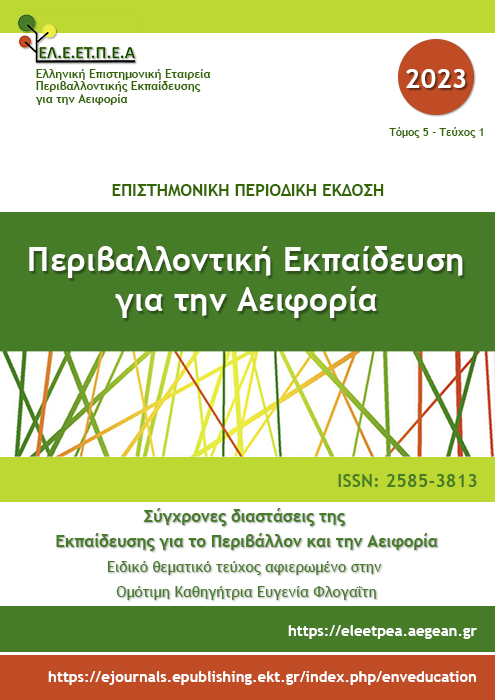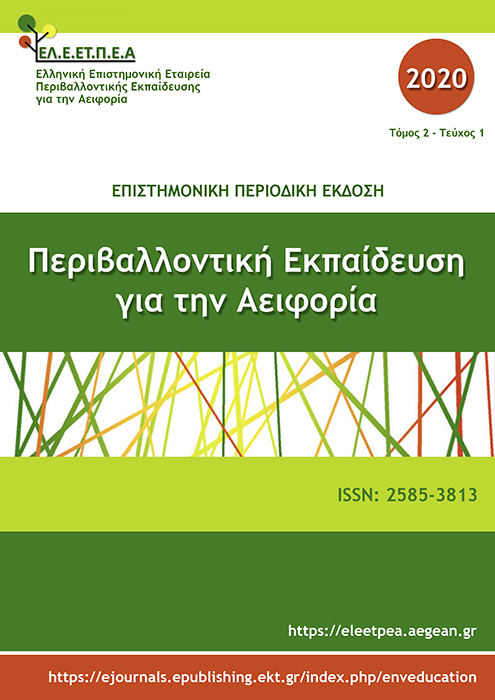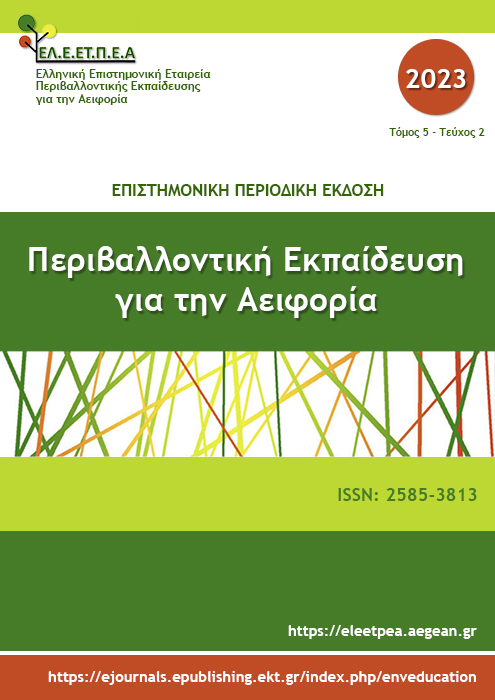Θαλάσσιος Γραμματισμός: Γένεση, εξάπλωση και εξειδίκευσή του στη Μεσόγειο Θάλασσα
Resumen
Ο παγκόσμιος ωκεανός αποτελεί ίσως το πιο συναρπαστικό και σίγουρα το σημαντικότερο χαρακτηριστικό του πλανήτη μας, καθώς φιλοξενεί τη μεγαλύτερη ποικιλομορφία ζωής και οικοσυστημάτων και συνιστά αναπόσπαστη πτυχή της πολιτιστικής ταυτότητας του ανθρώπου. Η συμβολή του είναι τεράστια, καθώς ρυθμίζει τον καιρό και το κλίμα, αποτελεί σημαντική πηγή τροφής, ενώ πολυάριθμες είναι οι χώρες που η οικονομία τους βασίζεται σ’ αυτόν. Ως εκ τούτου, η κατανόηση της δομής και λειτουργίας του αναδεικνύεται σε άμεση προτεραιότητα για την εξασφάλιση της αειφορίας του πλανήτη. Ωστόσο, παρά την εξέλιξη της επιστήμης και της τεχνολογίας, έχουμε καταφέρει μέχρι σήμερα να γνωρίσουμε μόνο ένα μικρό μέρος του, στοιχείο που εν πολλοίς μπορεί να αιτιολογήσει την περιορισμένη μας γνώση και ενδιαφέρον γι’ αυτό το μοναδικό περιβάλλον. Απαραίτητη κρίνεται λοιπόν η εισαγωγή ενός εξειδικευμένου πεδίου στο πλαίσιο του Περιβαλλοντικού Γραμματισμού που να εστιάζει σε σχετικά ζητήματα. Ο «Θαλάσσιος Γραμματισμός» αποτελεί την απάντηση σε αυτήν την πρόκληση και με τις βασικές αρχές που συγκροτούν το πλαίσιό του αναλαμβάνει τον ρόλο ενός κατευθυντήριου οδικού χάρτη που μπορεί να οδηγήσει σε εγγράμματους πολίτες. Η επιτυχής διάδοση αυτού του πλαισίου ενέπνευσε τη δημιουργία αντίστοιχου οδηγού εστιασμένου στις ιδιαιτερότητες της Μεσογείου, του «Γραμματισμού ως προς τη Μεσόγειο Θάλασσα». Το παρόν πόνημα περιγράφει τη γένεση και εξάπλωση του Θαλάσσιου Γραμματισμού, καθώς και την εξειδίκευσή του στη Μεσόγειο Θάλασσα και ολοκληρώνεται με συζήτηση για αξιοποίησή του στον χώρο της τυπικής εκπαίδευσης.
Article Details
- Cómo citar
-
Μόγιας Α. (2023). Θαλάσσιος Γραμματισμός: Γένεση, εξάπλωση και εξειδίκευσή του στη Μεσόγειο Θάλασσα. Περιβαλλοντική Εκπαίδευση για την Αειφορία, 5(1), 66–79. https://doi.org/10.12681/ees.35763
- Sección
- Articles

Esta obra está bajo una licencia internacional Creative Commons Atribución-NoComercial-CompartirIgual 4.0.
Οι συγγραφείς διατηρούν τα πνευματικά δικαιώματα και παρέχουν στο περιοδικό το δικαίωμα της πρώτης δημοσίευσης μαζί με την αδειοδότηση της εργασίας με CC-BY-NC-SA, που επιτρέπει σε άλλους να μοιράζονται αυτή την εργασία με αναγνώριση του συγγραφικού δικαιώματος και την αρχική δημοσίευση σε αυτό το περιοδικό.





